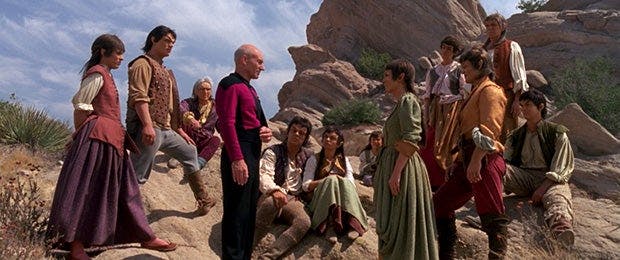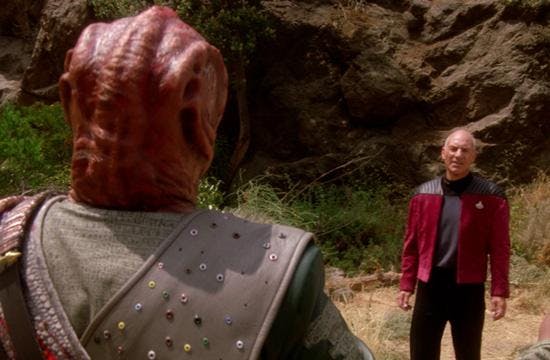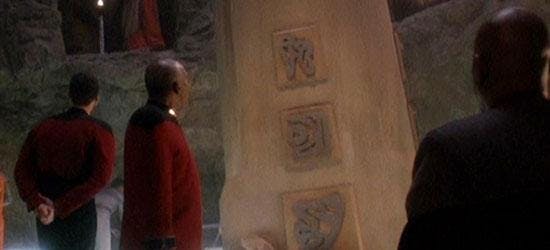Published Aug 28, 2014
The Study of Humanity: Trek Edition - Across The Universe
The Study of Humanity: Trek Edition - Across The Universe

In this series, we examine representations of anthropology in the Star Trek TV series. You can read parts one and two HERE and HERE to learn more about anthropology. In part two, we examined the Star Trek: The Next Generation episode “Who Watches the Watchers” (S3E4), and compared the representation it gives of anthropology and anthropologists with the current state of our discipline.
Although there are very few mentions of anthropology in the Star Trek TV series, there are several episodes which remind us of our discipline, and of cases documented by anthropologists.
There’s the episode "Darmok" (TNG S5E2), in which Picard goes through the difficult process of crossing cultural boudaries, experiencing the frustration of not understanding his counterpart, to move on, then, to enjoying the joy of having made a breakthrough at the end: this scenario would remind many anthropologists of fieldwork experience. Damork and Jalad at Tanagra indeed.

Then there’s the Star Trek: Deep Space Nine episode "Explorers" (S3E22). The scenario bears striking ressemblance to the case of anthroplogist’s Ben Finney’s involvement in the construction of a traditional Hawai’ian canoe built by the Polynesian Voyaging Society (PVS), the Hokule’a, whose voyages across the Pacific in the 1970s not only grave strong credibility to the oral history according to which Hawai’i had been populated by travellers from Tahiti, but also played a key role in the Hawaiian rennaissance. Finney took part in its first voyage in 1976 and was the first president of the PVS. Substitute Finney with Sisko, put the Hokule’a story in space, and you essentially have the scenario of the episode.
Interestingly, however, as reported on Memory Alpha, the episode was inspired by the voyage of the Kon-Tiki, a ship Thor Heyerdahl, a Norwegian explorer and ethnographer, used to sail from Peru to Tahiti in 1947. He was attempting to prove that it might have been possible that a Pre-Columbian South American civilization could have settled Polynesia. His theory was later disproved.
It seems, then, that while anthropology enjoys less visibility in Star Trek than other sciences, such as physics, astonomy or biology, for instance, it provides examples which are inspiring to Star Trek writers. After all, the mission of Starfleet officers is largely anthropological: exploring new worlds, seeking out new life and civilizations and reaching a better understanding of these. The fact that so many Star Trek scenarios remind us of cases documented by anthropologists is perhaps not entirely coincidental, then.
To learn more about representations of anthropology in science-fiction, head over to The Geek Anthropologist.

Do you know of other examples of representations of anthropologists in the Star Trek universe? Feel free to discuss them here!
__________
Marie-Pierre Renaud is graduate student of sociocultural anthropology in Laval University, Quebec, Canada. She specializes in native studies and her work focuses on healing and reconciliation processes. As the founder and a co-editor of The Geek Anthropologist blog, which is dedicated to the anthropological study of geek culture and all things geek, she writes about women in geek culture, the representations of indigenous peoples in science-fiction, and the changing definitions of geekiness. She can be reached at thegeekanthropologist[at]gmail.com. And check out her previous StarTrek.com guest blogs, A Study on Geek Girls, HERE and HERE.
Rayna Slobodian is currently an Undergraduate student in anthropology at York University in Toronto, Canada. Her love for Star Trek is genetic, as she was named after the android from the TOS episode, “Requiem for Methuselah.” The human story has always fascinated her, especially when it comes to exploring life through imagination. Her anthropological interests include death studies, human factors in space, classism, ethics, and science and technology studies. Feel free to reach her at rayna.ca[at]gmail.com.
